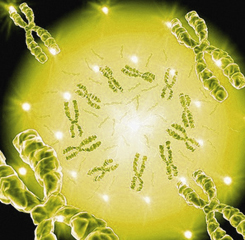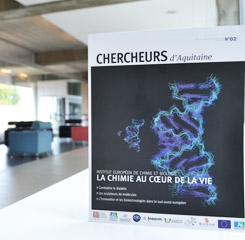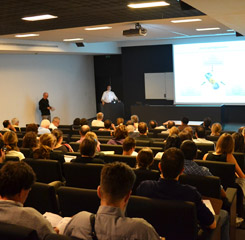|
|
|
 How can one gene code for several proteins? New elements published in Nature How can one gene code for several proteins? New elements published in Nature
Over 100 000 genes in wheat and only 30 000 in humans… Since 2003, genome sequencing has produced perplexing results, which are compelling biologists to focus on splicing, a process which can explain why advanced organisms such as humans contain a limited number of genes. IECB group leader Cameron Mackereth, together with colleagues from Spain and Germany, has now discovered how the human U2AF protein enables this process. The results were published online on July 13th in Nature.
|
|
Read more...
|

A 52-page magazine about IECB
Portraits of researchers, reports on diabetes, on the chemistry of wine, on the start-ups hosted at the institute, special features about Interbio, about the history of the IECB…
10 000 copies of Chercheurs d’Aquitaine will be disseminated over 2011.
> Download Chercheurs d'Aquitaine #2
|

250 researchers and entrepreneurs from South-West Europe meet at IECB
From the 26th to the 30th of June, 250 researchers and entrepreneurs attended to the first Interbio Week, organized by the Institut Européen de Chimie et Biologie (IECB) in Bordeaux. Over five days, participants from Barcelona, Bordeaux, Lisbon, Toulouse and Valencia had the opportunity to familiarize with systems biology and novel strategies in pharmacology (polypharmacology), to explore the new perspectives offered by microfluidic devices and to learn about the latest advances in RNA research.
|
|
Read more...
|
|
|
|
|
|
|
Page 18 of 20 |